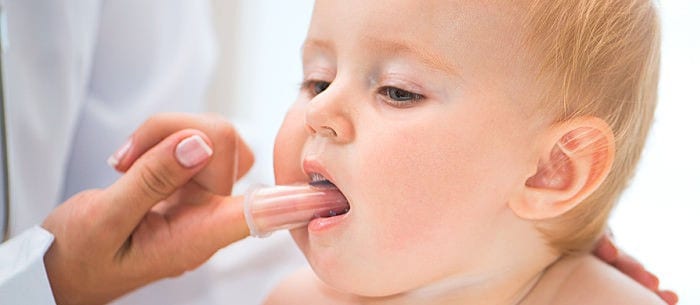You’ve probably been warned about what happens when a baby starts “cutting teeth” — Your cuddly bundle of sweetness will quickly turn into a drooling, screaming, feverish wretch who will fray your nerves and demolish hope of ever sleeping again! While that may be somewhat far-fetched, it is true that teething is a commonly misunderstood aspect of development associated with many unproven “horrors.”
Teething may not be nearly as responsible for baby’s behavior as we think, say Dr. Emily Bruckner of Tribeca Pediatrics and her brother, Dr. Daniel Bruckner of Balboa Pediatrics, a member at large of California’s Chapter 2 of the American Academy of Pediatrics.
Here, the brother/sister doctor duo debunk five teething horror stories by answering five common teething questions:
- “Cutting Teeth” — Do Teeth Cctually “Cut” Through the Gums to Emerge?
“Teeth don’t cut through the gum like a scissor cuts. They rub their way through,” says Dr. Emily Bruckner. Teething is a slow process by which the teeth move down (or up) and break through the membrane, she says. They don’t cut, jab or stab their way through.
- “The Scarlet Teether” — Does Teething Cause Fevers, Ear Infections or Diarrhea?
No, assert both doctors. If these symptoms arise, your little one probably has a cold or illness, says Dr. Emily Bruckner. She cites a large study in which researchers checked the temperatures of teething and non-teething babies every day and found no correlation between teething and fevers.“Fevers caused by teething is definitely a myth,” she concludes, although it seems the medical community remains divided on whether teething may be somewhat tied to these symptoms. Teething does cause an increase of mucus in the mouth, admits Dr. Daniel Bruckner, and when swallowed, could make for slightly looser stools — but not full-on diarrhea. As for ear infections? “The same nerve innervates the gums as the ears,” he says. “So if babies are having some discomfort with teething, they might feel it in their ears and touch them a lot.”
- “Night Fang” — Does Teething Cause Sleep Disturbances?
Many parents attribute disruptions in sleep training to teething, so there may be a bit of truth to this, both doctors assert. However, a larger culprit, suggests Dr. Emily Bruckner, is that parents are hypersensitive to their baby’s potential teething pain and therefore respond more quickly to their peeps and cries during the night. Rushing to your baby’s “aid” at the first sound of stirring can actually cause him to wake more often during the night than an incoming bicuspid will. Stick to your sleep training plan, they advise.
- “Grievous Gums”– Is Teething Painful?
Dr. Emily Bruckner says she’s seen every type of teether — from happy ones to uncomfortable fussers. While it’s hard to quantify a baby or toddler’s pain, “it would appear that the pain is mild enough to be soothed by a damp washcloth,” she notes. Teething begins at around 6 months and continues for three years, she adds, so if it were the horribly painful, excruciating experience many believe it to be, one would expect that babies would be miserable from half way through their first year of life until well into their third. We can probably all agree that isn’t the case, she says.
- “Debbie Drooler” — Does Teething Cause Drooling?
“All babies drool all the time,” says Dr. Emily Bruckner. Babies’ salivary glands are still developing, which means that they produce an excess of saliva without a reason. Her brother agrees that many parents interpret drooling as a sign that a tooth is on the way, but he supports the idea that the teething process does not induce excess drool.
Since babies tend to adopt the attitudes of their parents, if you don’t treat teething like a big deal, they won’t either. But if you perceive signs of teething pain, trust your gut. Soothe, comfort and perhaps, as Dr. Daniel Bruckner suggests, put some frozen fruit into a mesh feeder and let your little one gnaw on that. What not to do, warns his sister, is to use topical numbing solutions on your baby’s gums or “teething tablets,” as both may contain chemicals that are dangerous for babies.
For more on teething, check out these Teething Symptoms in Babies.
Olivia Briggs is a professional writer, mother and arts educator currently residing in her hometown of New York City. Follow her on twitter.




